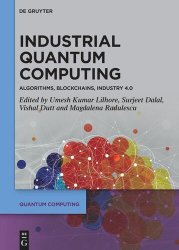Industrial Quantum Computing: Algorithms, Blockchains, Industry 4.0
- Добавил: literator
- Дата: 20-12-2024, 19:28
- Комментариев: 0
 Название: Industrial Quantum Computing: Algorithms, Blockchains, Industry 4.0
Название: Industrial Quantum Computing: Algorithms, Blockchains, Industry 4.0Автор: Umesh Kumar Lilhore, Surjeet Dalal, Vishal Dutt, Magdalena Radulescu
Издательство: De Gruyter
Серия: Quantum Computing
Год: 2025
Страниц: 294
Язык: английский
Формат: pdf (true), epub
Размер: 17.9 MB
"Industrial quantum computing" (IQC) covers the applications of Quantum Computing innovations in general industry and industry 4.0. This book presents the application of quantum computations to the financial sector, medical services, the logistics industry, and the manufacturing industry.
There are a lot of different computer programs that are being made and used in almost every area of life and study. As the number and complexity of problems rise, computers need more power, faster speeds, and better results. Quantum computers, based on ideas from quantum physics, were made to get around these problems. Quantum computers were created because of the need for faster computing. This was possible using quantum bits instead of regular bits, which keep 1 and 0 in a superposition state. This chapter briefly explains quantum computing and the ideas that make it work. This piece also talks about problems and trends with quantum technology. The big effects of Quantum Machine Learning (QML) are also talked about. In this cutting-edge field, QML is getting more attention. This chapter looks at different areas where study into quantum computing is missing and offers possible answers. Recently, details were given about many uses for Quantum Computing.
Quantum Machine Learning (QML) combined with classical machine learning provides hitherto unexplored computational capabilities for problem resolution. The goal of this chapter is to present a thorough analysis of the ideas and uses of quantum computing capacity on machine learning methods. A full analysis of popular QML algorithms, such as quantum principal component analysis, quantum support vector machines, and quantum neural networks, is conducted after an explanation of the foundations of the quantum concept and its distinguishing features. The critical assessment considers robustness, interpretability, and scalability in addition to evaluating the benefits and drawbacks of each method. The primary focus is on the merging of classical and quantum models, looking at areas of convergence that make use of the most advantageous aspects of both paradigms. This work addresses challenges associated with putting quantum algorithms into practice, including hardware constraints and error-reduction strategies. This chapter evaluates the state of quantum computing technologies and their applicability to real-world quantum machine learning applications, in addition to reviewing particular algorithms. This is jam-packed with cutting-edge discoveries and trends that shed light on where QML research will go in the future.
The final section of this chapter discusses potential future paths for QML, emphasizing the need for unified benchmarks, enhanced quantum hardware, and cooperative efforts between the Machine Learning and quantum computing groups. This concise review attempts to serve as a useful reference for scholars, professionals, and hobbyists navigating the quickly evolving field of quantum-enhanced Machine Learning by providing an extensive overview of QML algorithms.
Covers the basic principles and concepts of quantum computing: quantum bits, gates, and algorithmic quantum computing
Presents the most recent applications of quantum computing for Industry 4.0
Скачать Industrial Quantum Computing: Algorithms, Blockchains, Industry 4.0
Внимание
Уважаемый посетитель, Вы зашли на сайт как незарегистрированный пользователь.
Мы рекомендуем Вам зарегистрироваться либо войти на сайт под своим именем.
Уважаемый посетитель, Вы зашли на сайт как незарегистрированный пользователь.
Мы рекомендуем Вам зарегистрироваться либо войти на сайт под своим именем.
Информация
Посетители, находящиеся в группе Гости, не могут оставлять комментарии к данной публикации.
Посетители, находящиеся в группе Гости, не могут оставлять комментарии к данной публикации.
